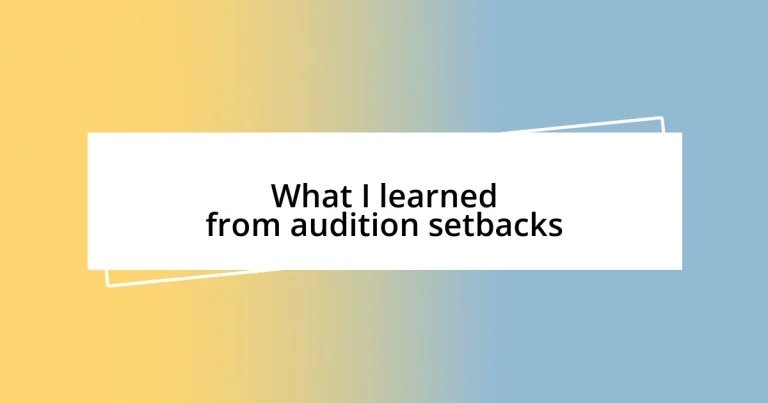Key takeaways:
- Setbacks in auditions should be viewed as learning opportunities, not failures, helping performers grow and refine their craft.
- Constructive feedback, though initially difficult to accept, can lead to significant improvements and deeper emotional connection in performances.
- Setting realistic, flexible goals can alleviate pressure and enhance confidence, allowing for exploration and enjoyment of the audition process.
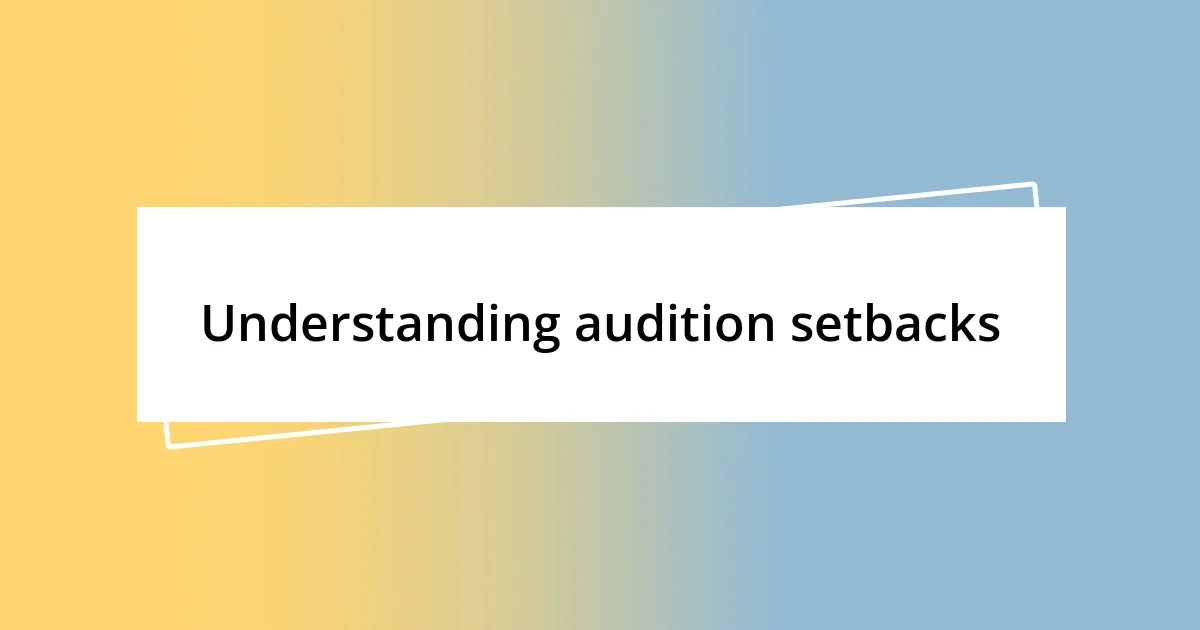
Understanding audition setbacks
Audition setbacks can feel like a personal blow, especially when you put your heart and soul into preparation. I remember one particular audition where I felt completely ready, only to stumble on a line that I had practiced countless times. It left me questioning my abilities—have you ever had that moment where everything seems to crumble in an instant?
Understanding these setbacks requires a shift in perspective. I’ve learned that each rejection often carries a lesson. After a particularly disappointing audition, I took a step back to reflect on what went wrong. Was it my choice of material? Did I misinterpret the director’s vision? It made me realize setbacks are not failures; they’re simply part of our growth trajectory.
Sometimes, the emotional weight of these experiences can be heavy. I recall feeling crushed after receiving feedback that stung a bit too much. But instead of dwelling on it, I asked myself, “What can I take from this to become better?” This self-reflection has been key in transforming setbacks into opportunities, allowing me to learn more about my craft and myself.
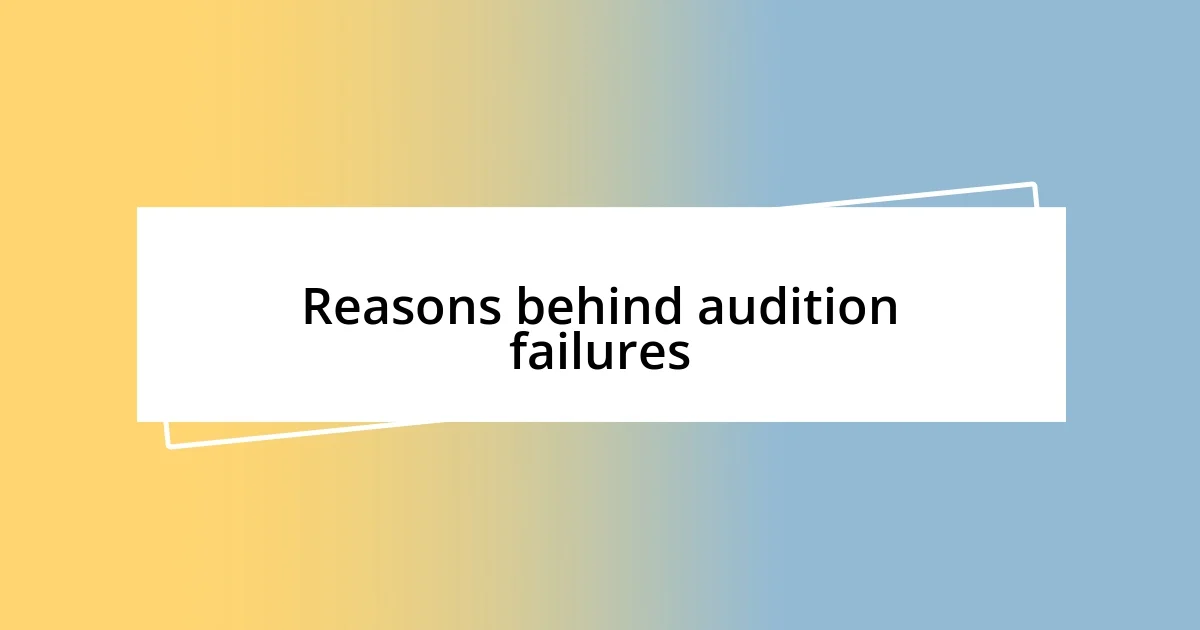
Reasons behind audition failures
There are many reasons behind audition failures that can sometimes feel overwhelming. One common reason is a lack of preparation. I recall a time when I hurried through rehearsals, thinking I could wing it. That backfired when I got to the audition and completely blanked on my lines. It was a tough lesson, reminding me that confidence can’t replace solid prep work.
Another factor can often be the choice of material. I once selected a monologue that I thought showcased my skills but, in hindsight, didn’t align with the role I was pursuing. The casting directors could see that disconnect, and suddenly my performance felt flat. It taught me the importance of understanding the character’s essence and matching my material to the audition’s context.
Nerves can also play a significant role in audition failures. I remember standing outside the audition room, heart racing, my mind swirling with negative thoughts about what could go wrong. Taking a deep breath and grounding myself in the moment helped a bit, but it reminded me to work on managing my anxiety for future auditions.
| Reason for Failure | Description |
|---|---|
| Lack of Preparation | Not rehearsing enough can lead to performance errors. |
| Poor Material Choice | Selecting unsuitable pieces can disconnect you from the role. |
| Nerves and Anxiety | Feeling overwhelmed can affect concentration and performance. |
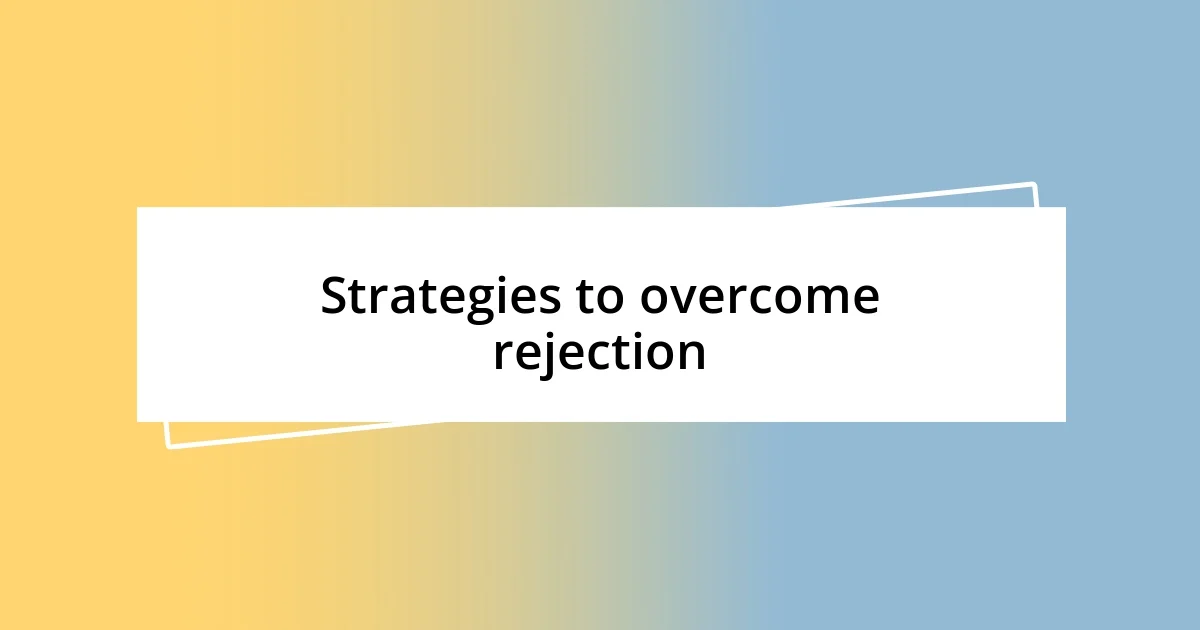
Strategies to overcome rejection
When it comes to overcoming rejection, I’ve found that acknowledging your feelings is crucial. It’s natural to feel down after a setback, but I’ve learned that engaging with those emotions can lead to powerful insights. I remember being heartbroken after an audition that felt right, yet didn’t go as planned. Instead of shoving those feelings aside, I took a day to simply process my thoughts. It was during this reflection that I realized how rejection isn’t a reflection of my worth but rather a part of a much larger journey.
Here are some strategies I’ve developed to build resilience in the face of rejection:
- Embrace Self-Reflection: Take time to examine what happened during the audition, both the good and the bad.
- Seek Feedback: Constructive criticism can undoubtedly help you improve, even when it’s tough to hear.
- Develop a Support System: Surround yourself with fellow performers who understand your struggles and can offer encouragement.
- Practice Mindfulness: Techniques like meditation can help center your thoughts and reduce anxiety.
- Set New Goals: Rather than dwelling on what’s lost, focusing on what can be achieved next can reignite your passion and drive.
These strategies have not only made me stronger but have also deepened my understanding of the audition process itself. Each rejection has become a stepping stone, propelling me toward growth rather than discouragement.
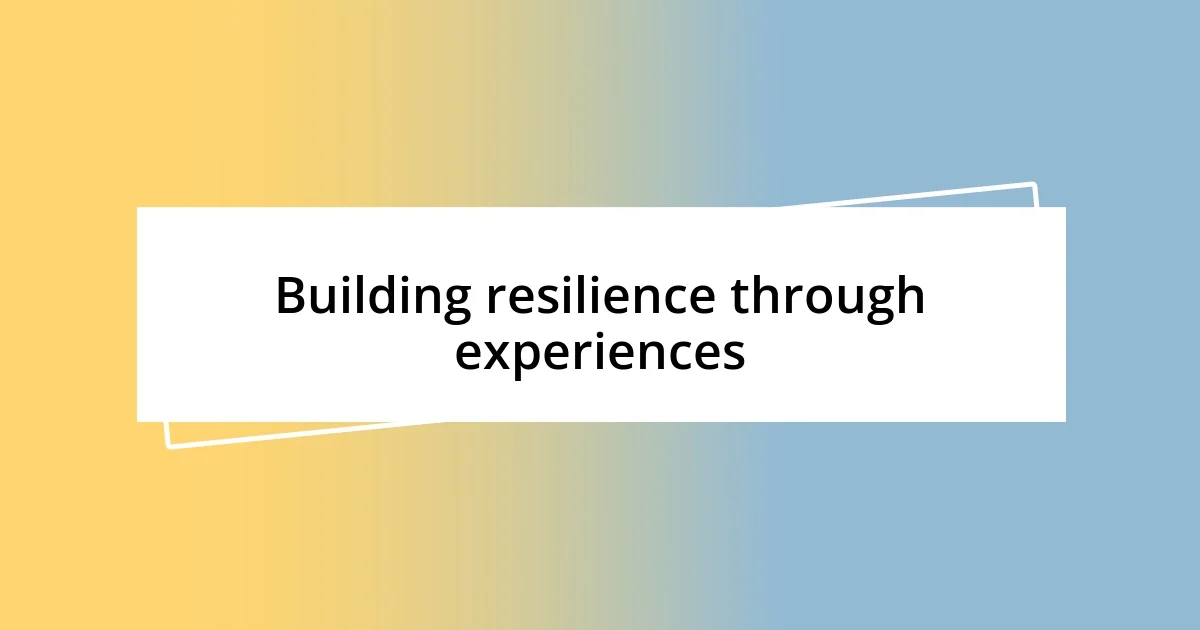
Building resilience through experiences
Building resilience through experiences often comes from facing challenges head-on. I remember a particularly tough audition where my nerves got the best of me; I stumbled over my lines and felt like I’d lost everything in that moment. In retrospect, I understand that these setbacks forced me to confront my vulnerabilities, ultimately teaching me to bounce back stronger and more prepared for the next opportunity.
Life has a funny way of shaping our resilience, doesn’t it? After another rejection, I decided to reflect on what I could control rather than what was out of my hands. Instead of succumbing to self-doubt, I started journaling my audition experiences, both the successes and failures. This simple practice not only provided a safe outlet for my emotions but also revealed patterns in my performances that I could improve upon. It’s fascinating how journaling turned from a mere task to a powerful tool for personal growth.
Each setback becomes a thread in the fabric of our resilience. There was a time when I didn’t think I could face another audition after a series of disappointing outcomes. But I realized that each experience was an opportunity to redefine my path. How do we truly learn if we never stumble? I’ve come to see failures not as dead ends but as pivots that guide me toward better auditions and ultimately, a deeper understanding of myself as a performer.
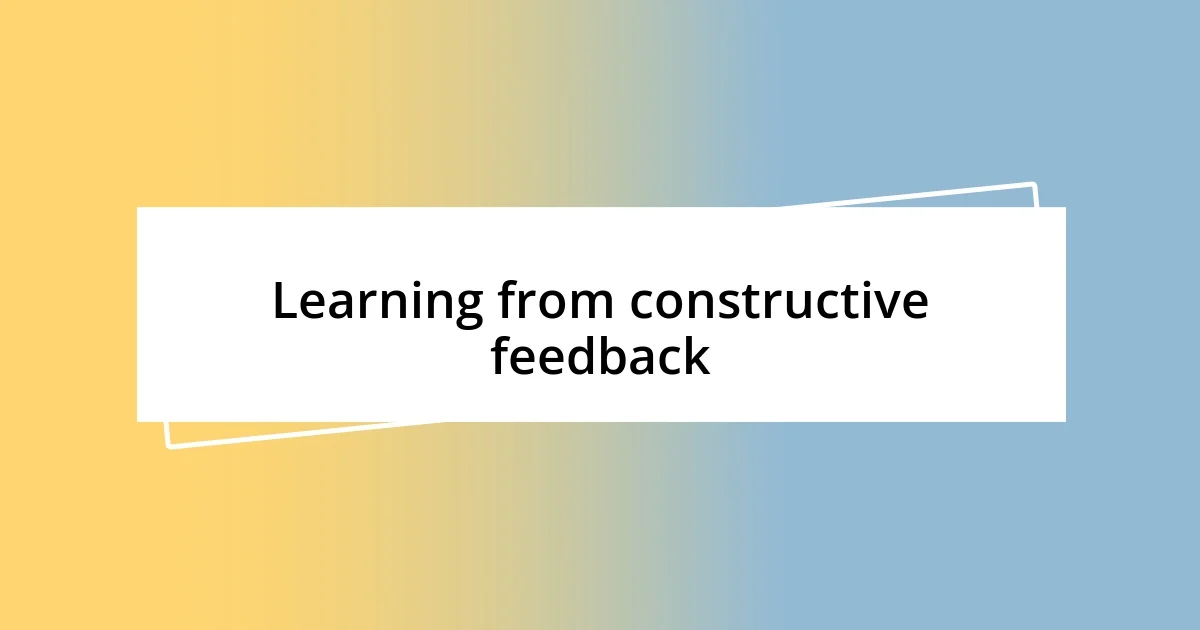
Learning from constructive feedback
Seeking constructive feedback has been a turning point in my journey. I recall a particular audition where a kind yet straightforward director pointed out that I lacked emotional depth in my performance. Initially, I felt defensive, but as I reflected on their words, it dawned on me how valuable this insight was. It was through this uncomfortable moment that I not only learned about the importance of emotional connection but also discovered my ability to convey a character’s true essence. Isn’t it interesting how our first response can often eclipse the gold hidden in feedback?
In another instance, a mentor shared a piece of advice that stuck with me: “Every critique is a clue.” This perspective transformed how I approach feedback. Rather than seeing it as a personal attack, I started to view each comment as a path to improvement. I remember listening to recordings of my audition and hearing things I hadn’t noticed before. With every piece of feedback, I crafted a new version of myself as a performer, turning what could have been discouragement into a guiding light. Have you ever had a moment where feedback completely shifted your outlook?
The emotional journey of absorbing feedback is complex, to say the least. There were auditions where, after hearing critiques, I felt a mix of gratitude and disappointment; it’s a tough balance. Yet, I embraced this raw emotion as part of the learning process. By engaging with critiques instead of shying away, I found growth in vulnerability. In a sense, each piece of feedback became a mirror reflecting areas needing attention. This process didn’t just inform my craft; it deepened my connection to my artistic self. How do you integrate feedback into your growth journey? For me, it’s a continuous, enriching dialogue that shapes who I am as an artist.
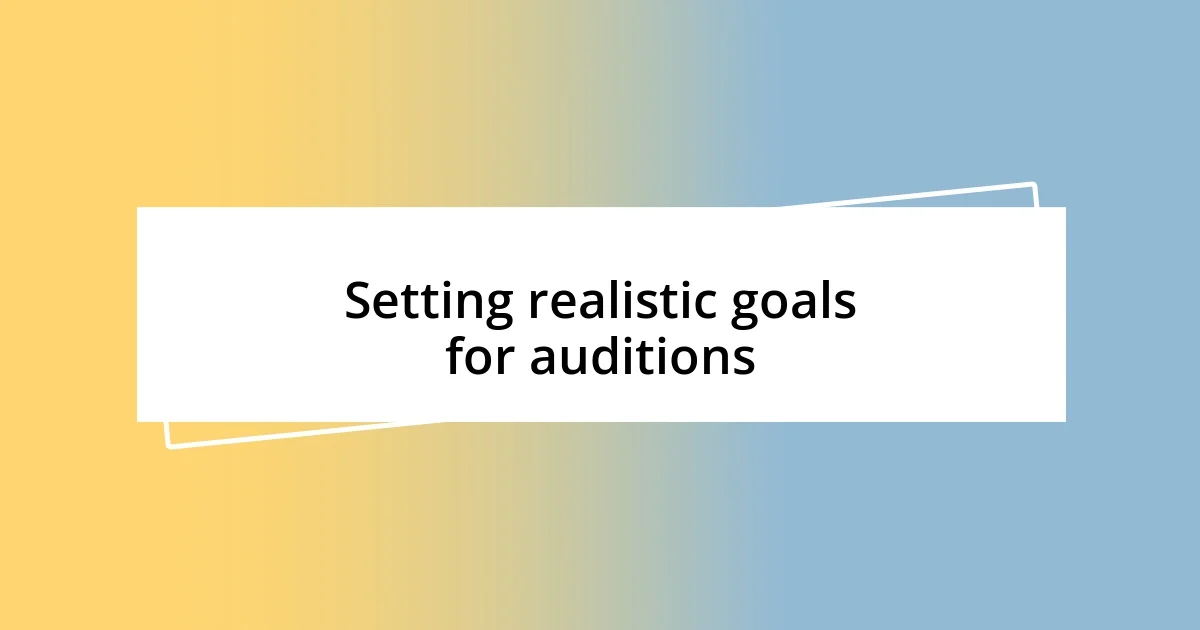
Setting realistic goals for auditions
Setting realistic goals can be a game-changer in the audition process. I remember my early days when I aimed for perfection in every audition. It often led me to overwhelming stress, which sometimes impacted my performance. Then I learned the power of setting attainable goals, like focusing on nailing specific lines or embodying a character’s emotion, rather than aiming for a flawless performance. It’s such a relief to realize that small, focused objectives can build confidence and make the whole experience feel more manageable.
As I moved forward in my journey, I began to celebrate my progress. After one audition where I felt I had truly connected with the character, I made a mental note to focus more on that emotional resonance in future auditions. It reminded me of the importance of acknowledging personal milestones. How often do we pause to appreciate even the smallest achievements? Adjusting my goals to emphasize learning and growth rather than just winning was liberating. This shift gave me something tangible to aim for, reducing the pressure while enhancing my enjoyment of the art form.
I also discovered the importance of being flexible with my goals. There were moments when I walked into an audition with one focus, only to realize something else was holding me back. Adapting my objectives mid-audition helped me concentrate on what truly mattered. For instance, during one audition, I noticed my nerves were affecting my breath control. Rather than fixating on my original goal, I shifted to grounding myself and finding calm in the chaos. Who would have thought that a slight pivot could lead to breakthrough moments? Embracing flexibility not only kept me grounded but also taught me invaluable lessons about resilience and adaptability in the face of unexpected challenges.
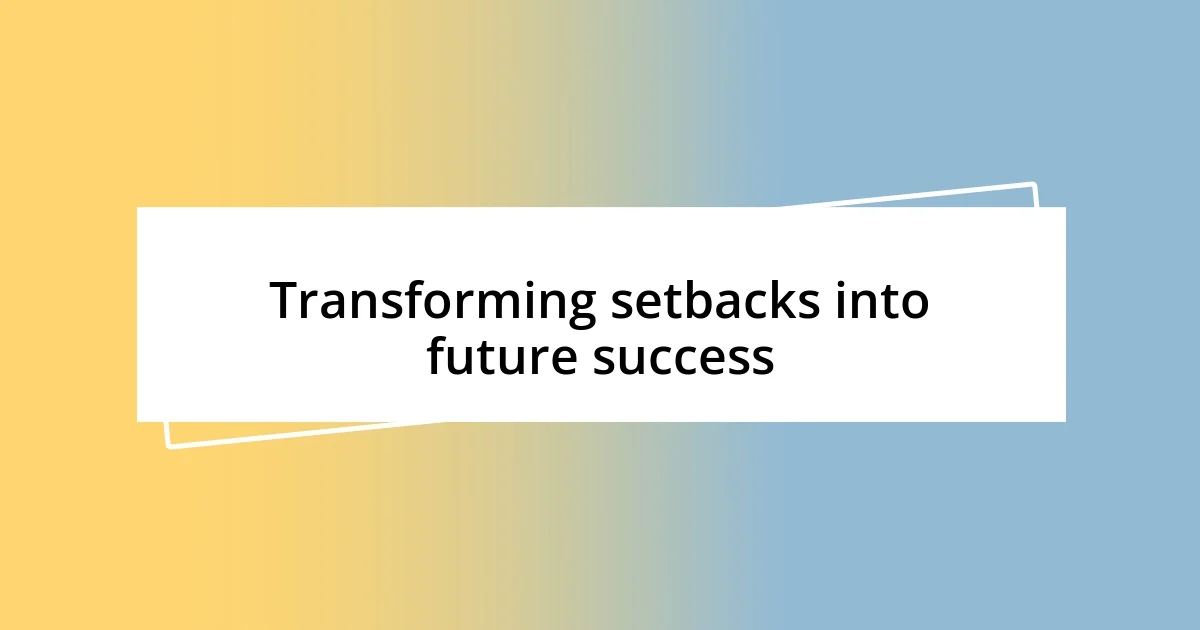
Transforming setbacks into future success
Transforming setbacks into future success often requires a shift in perspective. I recall a time when I faced a rejection after what I thought was my best audition yet. Instead of letting that setback define me, I chose to analyze the experience. I began to see it as an opportunity for growth. I asked myself, “What went wrong?” This self-inquiry is essential because it allows us to recognize areas of improvement while also reminding us that even the best performers have off days.
During another challenging moment, I faced a series of unsuccessful auditions, which could easily have discouraged me. Instead, I turned to journaling my experiences. Writing about my struggles and frustrations helped me process my emotions. I realized that each setback was a stepping stone, guiding me towards deeper self-awareness. Have you ever reflected on a tough moment and found the silver lining? For me, this practice made it clear that setbacks often hold the lessons we need to succeed in the future.
It’s fascinating how setbacks can forge resilience. After experiencing a particularly hard-hitting audition, I was tempted to give up. Yet, I instead channeled that disappointment into determination. I began to train more rigorously, exploring techniques I had previously overlooked. That setback became a catalyst for change. In retrospect, those moments of discomfort ended up being the very foundation of my artistic growth. It’s surprising how much strength we can derive from the situations that initially feel like the end of the road. How have your own hurdles transformed into triumphs? I invite you to reflect on your journey—there’s so much power in turning the perceived failures into future opportunities.












